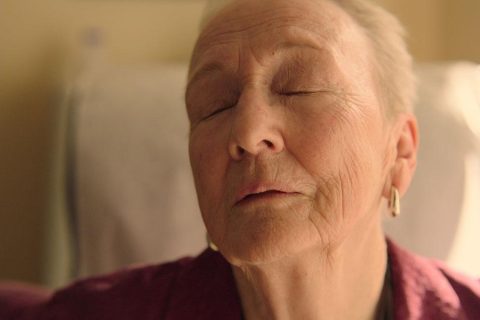There is a rich cinematic history of representing people with dementia. The pitfalls are obvious. For each past attempt, in an everlasting negotiation process, has produced its own critical scrutiny. Take the 2020 drama The Father, Florian Zeller’s acclaimed Oscar vehicle, which, if anything, succeeded in its depiction of Alzheimer’s as a tangible state of utter mental confusion. Having Anthony Hopkins and Olivia Coleman lead an illustrious cast, however, Zeller became soon too interested in capitalising on the thrill of conflicting subjectivities and concomitant searches for objective realities, not to mention the potential for dramatic emotional outbursts.
If for the vast majority of her standout feature-film debut Familiar Touch (2024), Sarah Friedland is able to avoid such narrative functionalisation, it is primarily to do with her interest in process and her patience with its unfolding. Such penchant is already discernable in the dialogue-free opening minutes, in which we see her octogenarian protagonist Ruth — played by the stellar Kathleen Chalfant — prepare an unlikely intricate version of lox toast for her middle-aged guest.
Unlikely, that is, for anyone but Ruth, a retired cook — but not a chef!, as she later stresses. There are certain things in life that resist obliviscence, and for Ruth, putting good, traditional fare on the table is one of them. Though the culinary part, it soon dawns on us, was never going to be a matter of concern. Not for Steve (H. Jon Benjamin), anyway, the man we see a cheerful Ruth doll herself up for in the initial few shots. If there had been any lox craving in him earlier this morning (hailing from a Jewish family, a not too outlandish proposition), it quickly dissipates in the light of Ruth’s overtures toward him, and with it, his patience.
Upon Ruth’s entering the lobby of Bella Vista, a residential care home which, to her mind, represents nothing more than the site of a splendid summer sojourn, we hear her say: “I don’t have kids, I never wanted one.” Unbeknownst to her, Steve, the man who just drove and delivered her to the reception desk, is her caring son, who, after hearing her words, quickly takes to his heels. Ruth’s unconscious, nevertheless, seems to pick up on the significance of their matutinal meeting. For soon after the stranger is gone, Ruth inquires after the man, who, after all, seemed kindhearted. “Will he be back?” Rather than insisting on the revelatory aspect of the scene in the Bella Vista lobby, Friedland allows it to take on weight in its own right — a testament to her training under directors such as Kelly Reichardt and Steve McQueen.
From here onwards, Friedland’s primary concern remains the focalisation of her protagonist, with whom, for the most part, we stay on eye level. Once we see Ruth arrange herself in the Bella Vista, Steve soon seems forgotten, and two of the care workers — the caregiver Vanessa and the physician Brian (Carolyn Michelle and Andy McQueen) — become her persons of reference.
There is a rare, self-evident tenderness in their interactions with Ruth in that the conventional hierarchies between them are either levelled or even reversed. For the audience, who adhere to Ruth’s point of view, watching her navigate the facility creates a double consciousness that demands ongoing reassessment of the perspectives offered in any given scene.
Representative of this paradigm are her regular meetings with Brian, whose responsibility lies in the training of her mental faculties. Following a scene where Ruth, in a heartwarming attempt to clear away all of her physician’s potential doubts about her lucidity, recites a comprehensive Borscht recipe, it is soon agreed upon that her examinations are not so much scheduled for her own gain, but arise rather from her goodwill toward Brian and the facility overall: “I see, I play the patient and you play the doctor.” Similarly, once Ruth catches wind of Vanessa’s grad-school coursework, she tries to keep her as much as she can off work, matter-of-factly taking on the kitchen duties of the bystanding cooks.
Friedland, whose training is primarily rooted in experimental filmmaking and choreography, has spent the past eight years in creative caring, in facilities not unlike the one in the movie. Scenes like these make that story easy to believe. It is undoubtedly this background that engenders an extraordinary level of discernment and, well, care for the minute aspects of everyday life in a residential care home, paired with curiosity for the physiological and kinetic aspects of advanced life stages. Her filmmaking remains consistently naturalist throughout, which seems all the more at odds with the sudden dramaturgical ambitions of the final third — an all-too-familiar touch for a film that, before then, felt anything but derivative.

Patrick Fey is a freelance critic, whose writing has appeared on Kino-Zeit, Critic.de, Filmstarts and Moviebreak.




